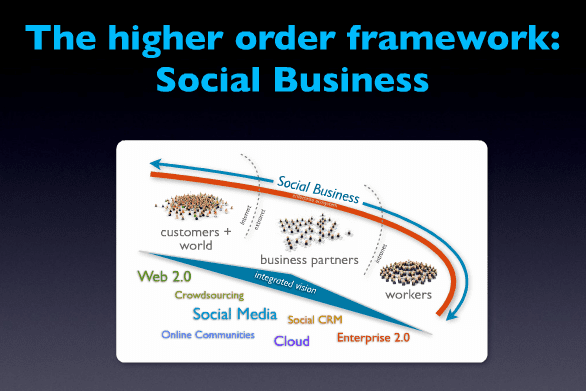How the 4Cs model of social business highlights ways to create shared value
 In my previous post I asked whether businesses are ready for social business and looked at 10 pitfalls of using social media which suggested many may not be. For those who are becoming proficient in using social media, understanding progression to social business is the next logical step. This begs the ‘what is social business?’ question. In this post I will look at the scope and applications of social business so that you can review how much progress your own organisation has made onto becoming a social business?
In my previous post I asked whether businesses are ready for social business and looked at 10 pitfalls of using social media which suggested many may not be. For those who are becoming proficient in using social media, understanding progression to social business is the next logical step. This begs the ‘what is social business?’ question. In this post I will look at the scope and applications of social business so that you can review how much progress your own organisation has made onto becoming a social business?
What Is Social Business?
So what does the term social business actually mean? Another buzz word coined by highly paid management consultants or a fundamental change in the modus operandi of your organisation, critical to future growth and competitiveness?
In simple terms, a social business develops new innovative work methods and processes through successfully applying social technologies across different value chain activities – sales, customer service, finance, logistics, HRM, quality, marketing, operations, internal processes, administration etc. Potential business benefits include improved efficiency, lower costs, increased sales, enhanced customer loyalty, enhanced partner and stakeholder relationships.
While the technology aspect is important, the two prerequisites for becoming a successful social business are the adoption of a social ‘mindset’ and social organisational structure (‘Be Social Before Doing Social’).
Social business involves work methods, organisational structures and ‘mindsets’ which are radically different from the ‘Industrial Age’ command and control structures still used by the majority of organisations. The use of social media and the adoption of a social ‘mindset’ moves from the periphery to the core of your organisation. It is no longer just about Twitter and Facebook. The key challenge is the way in which your organisation embraces and cultivates a spirit of collaboration based on open communications, internally and externally. Being lean, nimble and responsive to dynamic change based on engagement and transparency. What Don Tapscott called becoming a ‘Wikibusiness’.
In the words of Brian Solis, most companies have tried to remodel or retrofit existing marketing practices to new media. This has created the phenomenon of social brands. However, a social business is something altogether different:
A social business……embraces introspection and extrospection to reevaluate internal and external processes, systems, and opportunities to transform into a living, breathing entity that adapts to market conditions and opportunities.
The growing use of the term social business highlights the fact that the Social Media Revolution has major implications for all aspects your organisation, not just marketing or customer service. According to Hinchcliffe and Kim:
Social media touches the entire organisation, every department and every business process, every channel, every customer interaction, every investor and supplier relationship. Social is too important to be left to the Marketing Department.
At Energise 2-0, we use a ‘4Cs Model’ to explain the potential business benefits of ‘being social’. The key question to address is how can your organisation best use social technologies to build relationships and derive tangible business benefits from four main customer groups:
- Existing Customers
- Potential Customers
- Internal Customers (Staff)
- External Customers (Business Partners)
Here is a visual way of describing it:

Creating shared Value
The concept of shared, co-created value is critical to becoming a social business.
According to the Social Business Forum, a Social Business is:
An organization that has put in place the strategies, technologies and processes to systematically engage all the individuals of its ecosystem (employees, customers, partners, suppliers) to maximize the co-created value.
Their description of a social business emphasises the following:
- The historical Manichean separation between the inside and outside environments of a company no longer makes sense. While managers are still an important driver of organisational change, innovation can equally come from customers, employees, partners and suppliers. A social business adopts an ‘outside-in’ rather than ‘inside-out’ approach to innovation
- It is engagement not communication that makes the internal/external flow possible. Getting individuals engaged means accepting a variety of needs and using those needs to inform the organizational growth and evolution
- The existence of a corporation is no longer to exclusively generate value for its traditional stakeholders, rather it must now maximize the exchanged value throughout its entire ecosystem
- A social business is an organism that adapts to its environment and is thus able to consciously and frequently re-calibrate itself and the experience provided to its constituents based on intercepted stimuli
Why is social business important?
It is our view that social business has become ‘mission critical’ given the dynamic changes taking place in the global business environment – the Social Media Revolution, power shift to customers, declining effectiveness of traditional business/marketing approaches, the needs and expectations of Gen Y and Gen C (the connected generation), as consumers and as employees – topics that we have already covered extensively in numerous previous posts on this blog.
In follow-up articles, we will discuss the issues and steps involved in becoming a social business. For the moment, we would very much welcome your own thoughts and shared experiences.
Do you agree that we need to make the transition from social media to social business? How social is your organisation? Are you ready for such a fundamental shift? What barriers and obstacles need to be overcome?
All feedback and comments very welcome.

Thanks to
Jim Hamill for sharing their advice and opinions in this post. Jim is Director
Energise 2-0 and Business Fellow at Strathclyde Business School. Jim has delivered on a broad range of consultancy assignments around the World, with clients ranging from SMEs to ‘Blue Chip’ multinationals. of You can follow him on
Twitter or connect on
LinkedIn.




 Thanks to
Thanks to 

